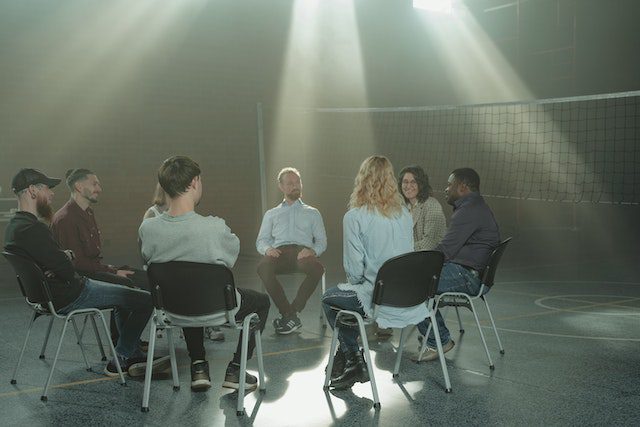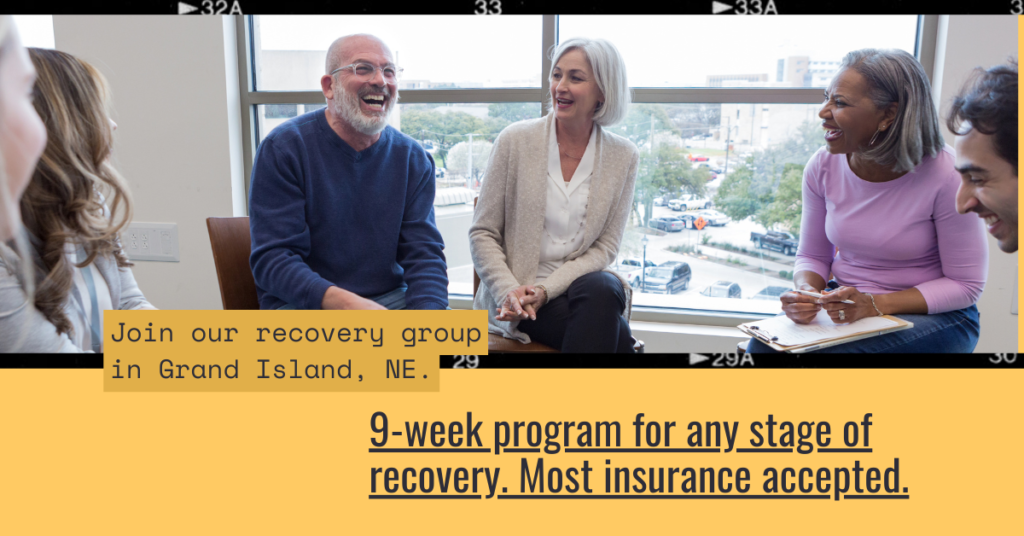Addiction counseling is essential when tackling the widespread addiction issue in Grand Island, Nebraska. In this article, we’ll dive into addiction counseling and why it holds such significance in our local community.
What’s Addiction Counseling?
So, addiction counseling is a specialized form of therapy that gives a helping hand to folks dealing with addiction. It’s a comprehensive approach that covers various therapeutic techniques, all aimed at helping individuals overcome substance abuse and addictive behaviors. We’re fortunate to have highly trained addiction counselors in Grand Island who know their stuff and can guide clients through recovery.
Why It Matters
Like in many other places, our community in Grand Island faces its fair share of challenges with addiction. Substance abuse and addictive behaviors profoundly impact individuals, families, and the overall well-being of our neighborhood. That’s where addiction counseling swoops in to save the day, providing a crucial support system for those in need. These dedicated counselors offer a wide range of services tailored to address the complex nature of addiction.
In Grand Island, addiction counseling is pivotal in helping individuals navigate the tough road to recovery. The counselors create a safe, judgment-free space where clients can dig into the root causes of their addiction, develop effective coping mechanisms, and gain the skills they need to maintain long-term sobriety.
But here’s the cool part—addiction counseling isn’t just about the individual. It recognizes addiction’s ripple effect on families, relationships, and our whole community. By tackling addiction head-on and involving families in counseling, these counselors help build healthy connections and support systems contribute to lasting recovery.

Understanding Addiction Counseling
Let’s look at what addiction counseling is all about in our neck of the woods—Grand Island. We’ve got some fantastic professionals here ready to lend a helping hand. And guess what? They take your privacy seriously too!
The Experts Who’ve Got Your Back
We’re lucky to have experienced professionals in addiction recovery at Alfrey and Pruitt Counseling. These folks are the real deal—they’re highly trained, experienced, and know their stuff. They’ve got the expertise and knowledge to guide you through your journey to recovery, so you can trust that you’re in good hands.
Your Privacy Matters
We get it—opening up about addiction can be challenging. That’s why our addiction counselors ensure confidentiality and privacy are top priorities. They create a safe and welcoming space where you can share your story without any worries. Rest assured that your information is kept confidential because your trust is essential.
Comprehensive Assessment and Individualized Treatment Plans
Our addiction treatment program is built on understanding your needs and creating an individual recovery plan for you. It’s all about giving you the personalized care you deserve.
Getting to Know You
First, you will have an initial assessment. This is when our addiction counselors take the time to understand your situation. They’ll ask you questions, chat about your history, and get a good grasp of your current substance use patterns. The goal is to get a clear picture of what you’re going through so they can provide the best support possible.
Tailored Treatment Just for You
Once our addiction counselors understand your situation, they’ll create a personalized treatment plan. It’s like a roadmap to your recovery, custom-made with your needs and goals. They’ll consider everything they learned during the assessment and craft a plan that’s a perfect fit for you.
Evidence-Based Therapeutic Approaches
Various evidence-based therapeutic approaches are utilized to support individuals on their path to recovery. Let’s explore some of these effective techniques.
Cognitive Behavioral Therapy (CBT)
Cognitive Behavioral Therapy (CBT) is a prominent approach in addiction counseling. It identifies and modifies negative thought patterns and behaviors linked to addiction. By helping individuals recognize and challenge self-destructive beliefs, CBT empowers them to develop healthier coping strategies and make positive life changes.
In Grand Island, addiction counselors employ CBT to assist clients in breaking free from destructive cycles and fostering long-term recovery.
Motivational Interviewing
Motivational Interviewing is another valuable therapeutic approach in addiction counseling. It aims to enhance an individual’s motivation and commitment to change.
Addiction counselors use motivational interviewing to support clients in exploring their motivations, strengths, and values. By creating a collaborative and non-judgmental environment, counselors empower individuals to identify their goals and work towards positive behavioral changes.
Group Therapy Sessions
Group therapy sessions hold significant value in addiction counseling in Grand Island. These sessions provide a supportive environment where individuals can connect with peers facing similar challenges.
Group therapy offers a space to share experiences, gain insights, and receive encouragement from others on recovery. It fosters a sense of community, reduces feelings of isolation, and promotes personal growth and accountability.
By incorporating these evidence-based approaches, our addiction counselors strive to enhance the effectiveness of treatment and contribute to the long-term success of individuals in their journey to recovery.

Relapse Prevention and Aftercare
Regarding addiction counseling in Grand Island, NE, there’s a strong focus on relapse prevention and aftercare. Let’s explore the strategies to prevent relapse and the support networks available for ongoing recovery.
Strategies for Preventing Relapse
Addiction counselors in Grand Island work closely with individuals to develop effective strategies that help prevent relapse. These strategies involve identifying triggers and high-risk situations, building coping skills, and creating personalized relapse prevention plans. By understanding the factors contributing to relapse, individuals can learn to navigate challenges and adopt healthy coping mechanisms to maintain sobriety.
Continuing Care and Support Networks
After completing the initial counseling program, individuals in Grand Island have access to continuing care and support networks that ensure ongoing recovery. These networks may include support groups, community organizations, and alumni programs. Continuing care is a valuable lifeline, offering community, accountability, and ongoing guidance to promote long-term success.
Moreover, addiction counselors in Grand Island play a significant role in connecting individuals with additional resources and services that can support their aftercare. This may involve referrals to healthcare professionals, therapists, or specialized treatment programs based on each individual’s needs.
Relapse prevention and aftercare are essential to addiction counseling. By equipping individuals with practical strategies to prevent relapse and fostering supportive networks, counselors empower them to sustain their recovery and lead fulfilling lives free from addiction.
It’s crucial to understand that recovery is a journey, and a relapse does not signify failure but rather an opportunity for growth. Through the available support and resources in Grand Island, individuals can find the guidance and encouragement needed to navigate challenges and maintain their efforts in recovery.
Holistic Approach to Addiction Counseling
Addiction counseling at Alfrey and Pruitt Counseling embraces a holistic approach that recognizes the importance of addressing not only the addiction but also co-occurring mental health disorders and involving family support.
Let’s explore how this comprehensive approach enhances the effectiveness of treatment.
Addressing Co-occurring Mental Health Disorders
Addiction counselors understand the intricate connection between addiction and mental health. They acknowledge that individuals often face co-occurring mental health disorders, such as anxiety, depression, or trauma, alongside their addiction.
Counselors integrate interventions that target addiction and underlying mental health concerns to provide thorough care. This may involve employing therapy techniques tailored explicitly for dual diagnosis, facilitating referrals to specialized professionals, and collaborating with psychiatric services.
Addressing the intertwined nature of addiction and mental health, the holistic approach in addiction counseling aims to promote overall well-being and long-term recovery.
Involvement of Family Support
The role of family support in the recovery journey of an individual facing addiction cannot be overstated. Recognizing this, addiction counselors at Alfrey and Pruitt Counseling actively engage family members in the counseling process. They offer educational resources, support, and therapy sessions to help families understand addiction, improve communication and develop healthy coping strategies.
By involving the family, a robust support system is established, significantly increasing the chances of successful recovery for the individual. This approach fosters understanding, empathy, and shared responsibility, enabling the family to provide ongoing support and encouragement throughout recovery.
Intensive Juvenile Outpatient Treatment Program (IOP)
Alongside the services provided for addiction counseling at Alfrey and Pruitt Counseling, a specialized program is designed explicitly for juveniles known as the Intensive Juvenile Outpatient Treatment Program. This program focuses on delivering comprehensive support and treatment tailored to the unique needs of young individuals grappling with addiction.
Personalized Support for Juveniles
The Intensive Juvenile Outpatient Treatment Program acknowledges the distinct requirements and approaches essential in the recovery journey of adolescents. It has been carefully crafted to address the challenges and complexities faced by young individuals confronting addiction. The program is facilitated by qualified professionals with specialized expertise in working with juveniles. They offer the necessary guidance and support throughout the entire treatment process.
Holistic Approach to Treatment
Adopting a holistic perspective, the program ensures that addiction counseling for juveniles encompasses not only the addictive behaviors but also any underlying mental health concerns that may contribute to the problem. The program devises a comprehensive treatment plan that nurtures their overall well-being by considering the emotional, social, and psychological aspects unique to young individuals.
Collaborative Support System
Recognizing the importance of family involvement, the Intensive Juvenile Outpatient Treatment Program actively encourages collaboration and support from parents or guardians. Family members are urged to actively participate in the treatment process, as they play a pivotal role in cultivating a supportive and nurturing environment that facilitates the juvenile’s journey toward recovery.
Tailored Therapeutic Techniques for Juveniles
The program incorporates evidence-based therapeutic techniques specifically tailored to suit the needs of juveniles. These techniques may include individual counseling, family therapy, group therapy, and educational sessions concentrating on developing life skills and effective coping mechanisms.
The primary objective of the Intensive Juvenile Outpatient Treatment Program in Grand Island is to provide young individuals with the specialized care and support required to conquer addiction. By comprehensively addressing their unique challenges through a holistic approach and actively engaging their families, the program strives to empower juveniles, enabling them to effect positive changes and attain long-term recovery.



